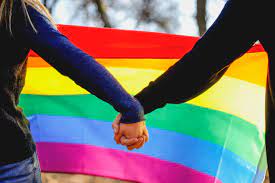Catholic members of LGBT+ communities in Latin America have welcomed a new Vatican declaration on the possibility of blessings for same-sex couples, including in nations where civil legislation does not recognize same-sex relationships.
Catholic faith communities that work with LGBT+ members have been formally organized over the past decades in Mexico, Costa Rica, Colombia, Chile, Brazil, Argentina, Peru, and Paraguay.
While populous nations like Brazil and Argentina approved same-sex marriage more than a decade ago, several countries in Latin America don’t have legislation allowing it. That’s the case with most of Central America and also with South American states such as Peru and Paraguay.
In 2017, the Inter-American Court of Human Rights declared that all countries that are signatories of the American Convention on Human Rights should provide access for LGBT+ people to the same rights as heterosexuals, including marriage, but many nations did not recognize the ruling.
In Peru, a number of bills have been conceived over the past years to allow LGBT+ unions to be recognized by the State, but all of them have failed to pass in Congress.
“In Peru, traditionalism in all forms is something very strong. It was one of the most important centers of Spanish America during colonial times and many social segments hold on to conservative traditions in all areas, including religion,” Miguel Jaimes, one of the leaders of the Peruvian Catholic community of diversity, told Crux.
According to Jaimes, an influx of Evangelical movements in the country since the 1960s intensified “rigidity towards same-sex marriage.”
“Many pastors became politicians. In Congress, they have been working to prevent bills concerning equal rights for the LGBT+ community to be approved,” he added.
In his opinion, Pope Francis launched a gradual process of opening the Church to people who had been excluded from it, such as divorced people and LGBT+ Catholics.
“A person of faith may have a failed marriage and want a divorce, but faith persists. It’s the same thing with LGBT+ people. Many of us have been formed by the Church since childhood and are now excluded,” he said.
Jaimes said that some LGBT+ persons may be unsatisfied with the new Vatican declaration, titled Fiducia Supplicants because it maintains a clear distinction between same-sex relationships and marriage.
“Many LGBT+ activists criticized the measure, considering it to be insufficient. But we can’t have an all-or-nothing kind of mentality. That’s a change in a centuries-old way of thinking,” he said.
In Paraguay, the 1992 Constitution established that marriages and de facto unions can only comprise man and woman. Over the years, leaders of the dominant Colorado Party declared on several occasions that they would veto any bill allowing same-sex marriages.
“There is a supremacist heritage in Paraguay that comes from the Spanish colonization and maintains a caste system in the country. Power and wealth are concentrated among a few families. That elite fears same-sex marriages and anything that endangers its social model,” Simón Cazal, a major gay activist and founder of the NGO Somosgay, told Crux.
Cazal, who met with Pope Francis during the pontiff’s visit to Paraguay in 2015, sees the blessings for same-sex couples as “a way of recovering a necessary human element in some rituals which are important in society.”
“I have always felt that the pope has decided to confront inequalities and symbolic violences like the ones perpetrated against the LGBT+ community. Inviting us to take part in a meeting with him, in a conservative country like ours, was a sign of that,” he said.
Cazal said that many in the Paraguayan urban clergy are connected to “reactionary movements which supported military dictatorships and so on,” and may not accept the Vatican declaration at first.
“But in the rural communities and villages, there are priests and bishops with a more open perspective,” he added.
Jose Silvera, a member of a Catholic LGBT+ group in Paraguay, told Crux that discrimination against LGBT+ people is huge in the country because themes like “sexual diversity and tolerance are not taught in schools, so they’re almost invisible in society.”
“At the same time, many politicians resort to anti-LGBT+ rhetoric during electoral campaigns, using LGBT+ people as a sign of social degeneration,” he added.
But society is changing in many parts of the globe and the pontiff somehow acknowledged it with his decision, Silvera affirmed.
“He has a pastoral focus on inclusiveness, mercy, and love and is inviting everybody, no matter their sexual orientation, to take part in the kingdom of God,” he said.
Getting married is symbolically important for many Catholic LGBT+ people and some couples were planning to do so in Argentina or Brazil.
“But I’m sure that with that Vatican measure now they will be interested in receiving a blessing in their own country,” Silvera said.
He added that there is no open communications channel between his community and the Church at this moment, but he plans to talk to the hierarchy about ministers who could give a blessing to same-sex couples.
“I don’t see why they should not comply with the pope’s decision,” he said. (https://cruxnow.com/church-in-the-americas/2023/12/lgbt-activists-across-latin-america-welcome-vatican-move-on-same-sex-blessings)





































